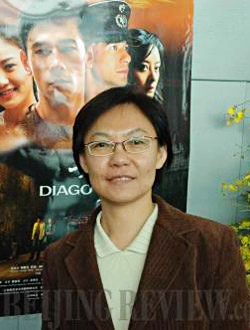|
"When Macao returned to China in 1999, many Macanese moved to Portugal, but later many moved back," said Alves. He said many families with both Portuguese and Chinese blood had to make the difficult decision on whether to move to Portugal. Alves' family, which includes his Portuguese wife and two sons, unanimously agreed that they should stay. He said their decision proved to be wise—the Macanese community in Macao has prospered over the past decade without needing to make changes to their lifestyles, while at the same time they have developed closer bonds with other ethnic communities.
But Alves said his decision to give up his Portuguese nationality and become a Chinese citizen in 2004 was not easy.
"It wasn't because of any economic concern or change to my personal life. It took me a long time to be psychologically prepared to embrace the Chinese culture," said Alves, who was raised in a predominantly Portuguese culture. The Macanese community in Macao still produces its own newspapers, a radio station, a television channel and schools.
As a member of the region's assembly, Alves pushed for the adoption of legislation in 1999 that gave Macao's Macanese who hold Portuguese passports an unlimited amount of time to change their nationality to Chinese. "In recent years, when I travel with tour groups setting out from Macao, I have found that about half of the Macanese hold Chinese passports," he said.
Since becoming a member of the National Committee of the Chinese People's Political Consultative Conference (CPPCC) in 2008, Alves has devoted time to studying Mandarin so that he could understand speeches at the annual session of the CPPCC's National Committee in Beijing. He made his own speech at the session in Mandarin instead of Cantonese, marking every character in his script with pinyin, a Mandarin phonetic transcription system.
"I now can understand most conversations in Mandarin. My spoken Mandarin is not that good, though, because I am afraid of making mistakes," he said.
He said his inner struggle between two cultures will no longer be a problem for his sons' generation. At his suggestion, his elder son, who is an executive at a car-racing company in Macao, went to Beijing to study Chinese for six months after graduating from a British university. Now father and son fly to Beijing almost every weekend to take Mandarin lessons.
"English and Mandarin will be without doubt the two universal languages of the world," said Alves.
Observer of change
 |
|
Lio Chi Heng (COURTESY OF LIO CHI HENG) |
Macao novelist Lio Chi Heng had a very busy evening when the movie Diago premiered at the Great Hall of the People in Beijing on December 4. The movie was adapted from her award-winning novel, The Hallucination World of Diago, which was written in 1998. The movie is based on the story of Diago, a young Macanese man who is living with his Chinese mother and stepfather in Macao. He goes to Portugal to find his biological father before Macao's return to China. He eventually discovers that his roots are in Macao.
"An important social issue in Macao in 1998 and 1999 was the Macanese people's decision on whether to stay in the region. That's why I decided to write this novel," said the 45-year-old writer.
Her satisfaction about her book partly comes from praise heaped on it by Macao's Macanese community.
"They told me that I accurately captured their inner struggles during that period," said Lio. She said most Chinese in Macao at that time looked forward to its return to China, as the economy was sluggish and they thought the mainland could help boost Macao's economy.
Lio said it was not too difficult for her to imagine the painful path of self-exploration by the Macanese as she also felt lost as a Chinese person born outside the country. She was born in Cambodia, grew up in Laos and attended university in Guangzhou, China's Guangdong Province. She took her first job in Macao.
"Cultural identity may not be a problem for people who were born and grew up in their home countries, but it can be a problem for expatriates and mixed-blood people," said Lio.
Being promoted from a literature column editor to the deputy chief editor of Macao's largest Chinese newspaper, Macao Daily News, Lio said her current job leaves her little time to write, but she manages to find time to write TV opera scripts. "Writing is a good form of rest for me," she said. | 